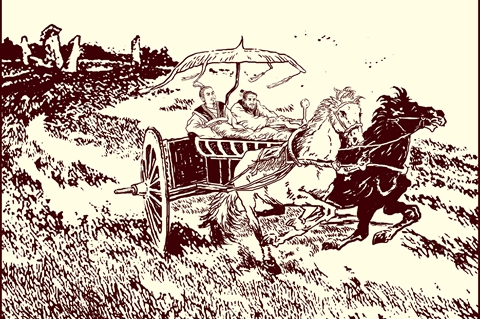At the end of the 11th century BC, Prince Tai Bo and his brother Prince Zhong Yong, heirs to the throne of Zhou, traveled south from present-day Qishan Mountain in Shanxi province, to an area of wilderness until stumbling upon Meili, known as Meicun Town today.
Their father, Emperor Zhoutai, wanted that his third eldest son would ascend to the throne and was sick because he was worried about this, so Tai Bo and Zhongyong chose to leave to meet their father’s wish.
Arriving in Meili, the brothers blended in with their new neighbors, cutting their hair short and tattooing their bodies. The brothers gained so much favor with the locals that they ascended to the ranks of emperors. They built baileys and established a small kingdom named Gou Wu. Tai Bo led the people to construct irrigation systems, develop agriculture, plant mulberries and breed silkworms as well as making pottery and smelting copper.
Later, after the Shang Kingdom was destroyed, the Western Zhou Kingdom became the biggest in China. At that time, Tai Bo’s small Gou Wu Kingdom was not recognized. Over time the Western Zhou Kingdom sought out Tai Bo and Zhong Yong’s descendant, and when they found him, a man named Zhou Zhang, the emperor of Western Zhou formally recognized the Wu Kingdom. During the next 24 generations from Tai Bo to He Lu with more than 600 years passing, Meili was the capital of the Wu Kingdom.
The culture of the central plains, which Tai Bo and Zhong yong brought to the southern Yangtze area, was combined with the local culture, and thus nurtured gives Wu Culture distinctive characteristics.
 |
|
?Prince Tai Bo and his brother Prince Zhong Yong traveled south from present-day Qishan Mountain in Shanxi province to an area of wilderness until stumbling upon Meili. |